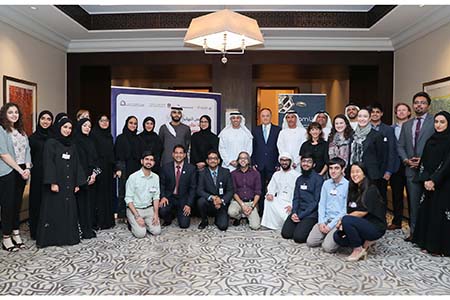More than 70 university students submitted proposals for ?Life in Space? and ?Energy in Space? experiments. Winners will have the opportunity to have their experiment launched to the ISS in 2020.
 The UAE Space Agency (UAESA) has revealed the winners of the student experiment competition ?Tests in Orbit?, sponsored by the UAE Space Agency and organised by The Higher Colleges of Technology (HCT). The winning teams were announced during the final workshop of the competition, which was held on 18 March at the St. Regis Saadiyat Island, Abu Dhabi, where the final contestants presented their proposals in front of the judging panel.
The UAE Space Agency (UAESA) has revealed the winners of the student experiment competition ?Tests in Orbit?, sponsored by the UAE Space Agency and organised by The Higher Colleges of Technology (HCT). The winning teams were announced during the final workshop of the competition, which was held on 18 March at the St. Regis Saadiyat Island, Abu Dhabi, where the final contestants presented their proposals in front of the judging panel.
The two winning teams of ?Tests in Orbit? were New York University Abu Dhabi (NYUAD) and Khalifa University. The winners will have the opportunity to work alongside space experts from NanoRacks and DreamUp, to build their experiments and have them launched to the International Space Station (ISS) in 2020.
NYUAD?s experiment ?Cytokine-Hematopoietic Stem Cell Interaction in Microgravity Environment? aims to improve astronauts? health in the future by uncovering the reasons behind the decrease in our immune response when exposed to microgravity or space-related conditions.
Khalifa University?s experiment ?The Effect of Micro-gravity on Coronary Nitinol Stents? aims to study the mechanical performance of Nickel-Titanium Stents within the human body when exposed to microgravity or space-related conditions. Stents are used in a wide range surgeries and play an important role within the medical industry.
HE Dr. Eng. Mohammed Nasser Al Ahbabi, Director General of the UAE Space Agency, said: ?Competitions like ?Tests in Orbit? play a key role in inspiring the next generation of space pioneers. These types of activities also enhance our national capabilities by encouraging the peaceful application of space science and research, contributing to the growth and development of the UAE?s space sector.?
?I would like to thank our partners at the Higher Colleges of Technology, NanoRacks, and DreamUp, who played a major role in organising the competition and providing these young talented students the chance to forge ahead with their dreams of space exploration by having their experiments launched to the International Space Station,? added H.E. Dr. Eng. Al Ahbabi.
Eng. Hamda Al Shehhi, ?Tests in Orbit? Competition Manager, said: ?We received so many incredible ideas and proposals for the ?Tests in Orbit? competition, which reflects the next generation?s passion for the space sector, their creativity and innovation, and their ability to work as part of a team. We look forward to getting even more interest from UAE students in such competitions and receiving new proposals and ideas for space science and exploration.?
Carie Lemack, Co-founder and CEO of Dream Up, and a jury member of ?Tests in Orbit? competition, said: ?We were impressed by the innovative and thoughtful ideas presented by all the finalists. Choosing only two winners was no easy task – all the students demonstrated that they are critical thinkers capable of driving research and discovery on Earth and in space. We congratulate each one and are excited to support their future goals and accomplishments as they reach for the stars and beyond.?
Another jury member, Jeffrey Manber, CEO and Co-founder of NanoRacks, said: ?It is so important for the next generation to be prepared for leadership in the space industry. The ?Tests in Orbit? competition provides an incredible opportunity for students in the UAE to fly science research to the Space Station and take those first steps. For all of us at NanoRacks, we?re thrilled to be part of such a historic program, and to see first-hand how committed the UAE is to engaging youth in space exploration.?
The ?Tests in Orbit? Competition encourages university students across the UAE to develop, design and conduct a ?nano-experiment? on the effects of microgravity on human health or energy resources. The competition attracted more than 70 students from universities across the UAE, who submitted proposals for ?Life in Space? and ?Energy in Space? experiments. The submissions were reviewed by a panel of highly qualified HCT faculty, space scientists and representatives from the UAE Space Agency and NanoRacks










































































